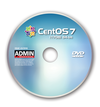Sys Admins Will Love Red Hat Enterprise Linux 7.4
Red Hat has announced the release of Red Hat Enterprise Linux (RHEL) 7.4, which has many features to make the life of a sys admin easy.
One of the main areas of focus this release is security. Those sys admins who are experimenting with containers can now take advantage of SELinux for their container workloads. RHEL 7.4-based RHEL Atomic Host comes with enhanced container security functionality with full support for using SELinux with OverlayFS to secure the underlying filesystem and the ability to use Docker and namespaces together for fine-grained access control.
In addition to SELinux support for OverlayFS, RHEL now has full support for the overlay2 storage driver. It also brings full support for package layering with rpm-ostree , providing a means of adding packages like monitoring agents and drivers to the host operating system. The latest release of Atomic Host also introduces a technology preview of LiveFS that allows users to install security updates and layer packages without a reboot. Goodbye reboots.
What sys admin doesn’t love automation? RHEL 7.4 comes with the technology preview of RHEL System Roles, which brings together the capabilities of Red Hat Satellite and automation via Ansible Tower.
Red Hat said in a press release that the new technology offers “a common management interface across all major versions of Red Hat Enterprise Linux, enabling an automated workflow via Ansible automation to be created once and used across large, heterogeneous Red Hat Enterprise Linux deployments without additional modifications."
“The modern enterprise will not be solely based in physical servers or cloud services; rather, the path to digital transformation weaves across four distinct technology footprints,” said Jim Totton, vice president and general manager, Platforms Business Unit, Red Hat. “The latest version of the world’s leading enterprise Linux platform supports each of these deployment methodologies with new security features, improved performance and introduces new automation capabilities to cut through the inherent complexities of heterogeneous datacenters.”
RHEL is also used on enterprise desktops and laptops. RHEL 7.4 comes with a feature called USB Guard that allows sys admins to set policies for known and unknown USB devices. As a result, plug-and-play devices can be used by specific users to limit both data leaks and data injection.
Subscribe to our ADMIN Newsletters
Subscribe to our Linux Newsletters
Find Linux and Open Source Jobs
Most Popular
Support Our Work
ADMIN content is made possible with support from readers like you. Please consider contributing when you've found an article to be beneficial.



